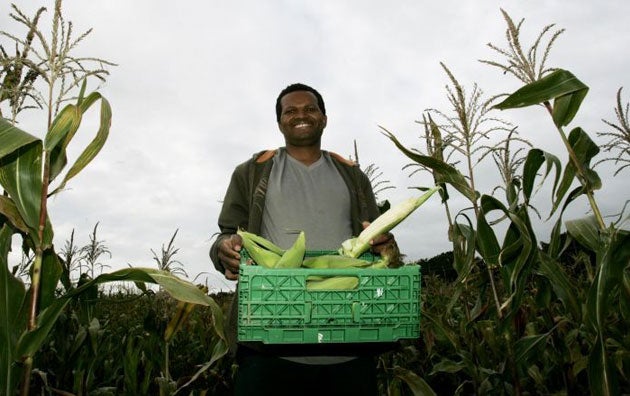An unusual story of country folk
David Mwanaka has fielded regular visits from police after complaints that he is stealing crops – from his own farm. Jerome Taylor finds out about life for a black farmer in Britain

Like many other British farmers hit by the wet weather and rising price of red diesel fuel, it has not been an easy summer for David Mwanaka, toiling for as long as daylight allows in soggy conditions. And he has had to grapple with one extra problem: the police.
In the past two weeks, Leicestershire police have been called out three times by "concerned locals" to investigate reports of a man stealing crops from six acres of fields. Each time the 42-year-old farmer had to explain that he was doing nothing more criminal than harvesting his own corn.
The reason for the misunderstanding, Mr Mwanaka believes, was quite clear. Those who reported him saw a black man in a field and simply could not countenance the idea that he might be a bona fide farmer and not a thief.
As one of only two known black farmers in Britain – the other being Wilfred Emmanuel-Jones, the self-styled "Black Farmer" sausage-maker and prospective Conservative parliamentary candidate for Chippenham – Mr Mwanaka knew his choice of profession was unusual, but had not thought he might be accused of stealing from himself. "I was working in the field on a Saturday with my wife and a friend when four police cars drove up," he said yesterday, charging along in his mud-flecked 4x4 to load white maize from another of his smallholdings in north London.
"The officers told me that some neighbours had reported a black man stealing crops from a nearby field. I told them I was cropping my maize but they didn't believe me."
According to Mr Mwanaka's account, the officers then asked him to provide identification before searching his van and radioing in a vehicle check.
It was only when he called the white landlord from whom he rented the six acres in Rothley, Leicestershire, that they finally believed him. He said that he felt humiliated.
Two days later the same thing happened, and last Wednesday police made a third visit. "I was standing in the middle of my field when a police officer called out to me and asked me to come over. I was surprised when it happened the first time, but three times is too much. The police clearly hadn't shared the information or informed each other about what was happening."
Mr Mwanaka moved to Britain in 1991 from Zimbabwe, where he was a playwright and journalist. He said yesterday that the recent incidents were the first time he had ever felt classified by his race.
"I never have had a problem with fellow farmers," he said. "They've always been extremely helpful to me. I guess these were ordinary members of the public who weren't used to seeing a black man in his field." He preferred not to accuse anyone of racism, blaming it instead on "ignorance". He would be worried, he added, were it the same people calling the police: "Then I would think it is malicious."
A spokesman for Leicestershire Police said the force's officers had a duty to respond to calls from members of the public reporting a suspected crime.
Born in Nyanga, a remote and rural part of Zimbabwe where farming is a way of life, Mr Mwanaka moved to the city to train as a journalist, spending much of his early professional life writing plays and working for publications with strong trade union affiliations. He fell foul of the increasingly violent regime of Robert Mugabe and decided that he could no longer work safely in his home country.
"It became increasingly difficult to work as a journalist. When it became clear there was absolutely no freedom of expression I packed my bags and headed for England."
Keen to prove himself, the 25-year-old had hoped to work as a reporter in Britain. He was amazed at the level of freedom afforded the media. "I remember watching people like Jeremy Paxman and being astonished, I couldn't believe he was allowed to talk to politicians like that". But Mr Mwanaka was hampered by his strong Zimbabwean accent and struggled to find work. "It was frustrating no one would hire me, but I guess with my accent I was hardly going to get a job at the BBC." Instead, Mr Mwanaka did what many others like him had done before: he took any work he could find, including stints as a traffic warden, a factory worker and a paper boy.
His career as a farmer arrived by accident. While socialising with fellow Zimbabweans and South Africans, Mr Mwanaka and his friends would dream of getting their hands on white maize – a much sweeter version of the corn on the cob we get in Europe; a variant that is popular in Africa, the Middle East and Asia. So Mr Mwanaka and his wife Brenda began growing it in the garden of their small London townhouse near Tottenham Hotspur football club.
"I remember one of the neighbour's sons came round asking if he could retrieve his football from the 'forest' in the back garden," he recalls. "It was only then I realised how much I was growing." Fast forward 10 years and one of Britain's most unusual farmers now has fields he tills in Wiltshire, Leicestershire and Enfield, in north London's outskirts. He commutes to each from their home in Basildon, Essex. Clients for his white sweetcorn include Sainsbury's, which attribute the product's success to demand from African expats.
"The taste of white maize is simply fantastic," says Mrs Mwanaka. If only those policemen would stop disturbing the harvest.
Join our commenting forum
Join thought-provoking conversations, follow other Independent readers and see their replies
Comments
Bookmark popover
Removed from bookmarks